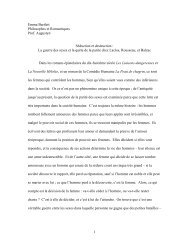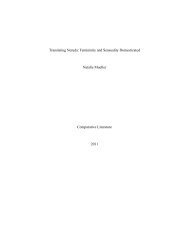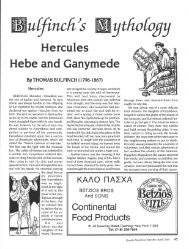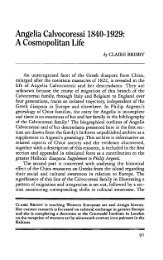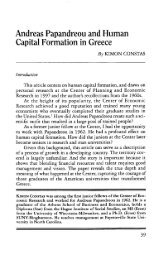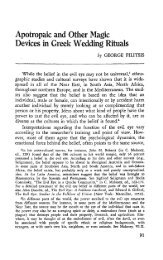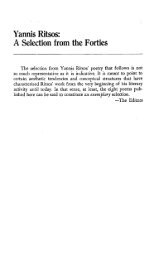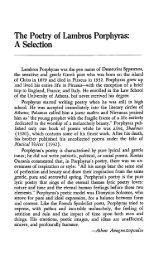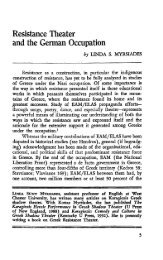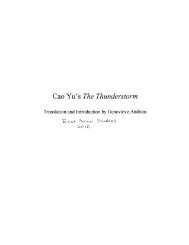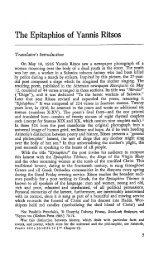Mythistorema - Triceratops Home
Mythistorema - Triceratops Home
Mythistorema - Triceratops Home
Create successful ePaper yourself
Turn your PDF publications into a flip-book with our unique Google optimized e-Paper software.
38<br />
JOURNAL OF THE HELLENIC DIASPORA<br />
light, which makes him realize that he has lived up to that point according<br />
to an illusion. Seferis' protagonist, however, when he becomes aware<br />
of his own illusion, finds the reality disappointing and the truth bleak:<br />
Again another well inside a cave.<br />
Once it was easy<br />
To bring up from its depth idols and ornaments<br />
To give pleasure to the friends who still remained faithful to us.<br />
The ropes have broken now; only their marks on the well's<br />
mouth<br />
Remind us of our departed happiness.<br />
He knows now that what he used to bring up from the well were<br />
"idols and ornaments," but he can no longer draw them up, because "the<br />
ropes have broken" now for him. In contrast to Plato's ideas, according<br />
to which man passes from meaningless illusion to enlightenment, the protagonist<br />
in Seferis' poem passes from illusion to despair. Awareness is<br />
distressing for him because he discovers his self-deception, but this is<br />
essentially his tragedy. As Oedipus sees the truth and the truth blinds<br />
him, or as one of Ibsen's heroes in the Wild Duck discovers the truth<br />
and this has a devastating effect, here the protagonist, who in the past<br />
used to bring up idols from the well's depths "to give pleasure to the<br />
friends who still remained faithful," now that the ropes are broken<br />
feels betrayed—the truth is painful. He puts his fingers on the rim of the<br />
well, and the marks on its mouth remind him of his "departed happiness."<br />
In Plato's view, the man who is exposed to the light of true knowledge<br />
is intoxicated by it; the shadows of the phenomenal world do not<br />
satisfy him anymore because his world has been expanded. Seferis' poem,<br />
with all its ambiguity, implies that the happiness imparted by the illusion<br />
to which the protagonist seems still to cling cannot be disregarded so<br />
easily.<br />
In contrast to Plato's conception, according to which the physical<br />
world, as a mere reflection of the superior world of ideas, is to be rejected<br />
by the enlightened matt, Seferis suggests with his poem—especially<br />
the second half of it—that the physical aspect of this world cannot be<br />
underestimated. This is emphasized by the sensuous handling of the last<br />
image of the poem, the interaction of the soul and the body:<br />
The fingers on the rim, as the poet says.<br />
The fingers feel for a moment the cool of the stone<br />
And the body's fever passes into the stone<br />
And the cave stakes its soul and loses it<br />
Every second, full of silence, without a drop.<br />
Seferis wrote in the first volume of his Journals that he considered



